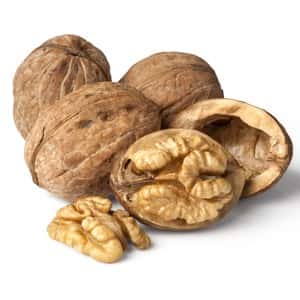
The flip-flop is official. Nuts are no longer bad. Thanks to new research from The New England Journal of Medicine (Nov. 21, 2013), we are now urged to eat nuts daily to reduce our risk of heart disease.
This is a complete U-turn from advice Americans were given during the low-fat heydays of the 1970s and 1980s. Then, physicians told us that if we indulged in high-fat foods like nuts we would clog our coronary arteries.
A handful of peanuts, cashews or, worst of all, macadamia nuts, were considered almost as sinful as eating eggs for breakfast. (Macadamias were especially vilified because they contained the most saturated fat).
Although Americans are still warned to stay away from sat fat (found in peanuts as well as tree nuts like cashews, pecans and walnuts), the scientific evidence now proves beyond any doubt that these are heart-healthy snacks.
Researchers have been reporting the health benefits of nuts for decades. In 1992 the Adventist Health Study had tracked over 30,000 Seventh-Day Adventists for six years. Their dietary intake of various foods was noted and nut consumption was linked to half the rate of heart attacks (Archives of Internal Medicine, July, 1992).
Unfortunately, the message didn’t convince the low-fat enthusiasts to change their tune. Throughout the 90s Americans were urged to cut down on fat and keep nuts to a minimum. Reduced-fat peanut butter showed up on grocery store shelves and in lunch boxes.
Two of the largest, longest-lasting population studies have just confirmed the value of eating nuts and even peanuts. The Nurses’ Health Study followed more than 76,000 women from 1980 to 2010. In the Health Professionals Follow-Up Study, more than 42,000 male dentists, pharmacists, optometrists, osteopaths, veterinarians and podiatrists were followed from 1986 to 2010. All these health professionals fill out questionnaires every two years about their diets, lifestyle activities and health.
Analyzing this huge amount of data demonstrated that the volunteers who ate nuts at least once a week were less likely to die during the study than those who rarely or never ate them. In fact, those who ate nuts daily had the best results, cutting their risk of death during those decades by about 20 percent.
The benefits were especially strong for cardiovascular and heart disease. Nut lovers were 25 to 30 percent less likely to die of such problems. That’s better than some cholesterol-lowering drugs can offer.
But, you may be thinking, nuts are so fattening! Didn’t those folks eating peanuts, walnuts, almonds or pecans almost every day gain a ton of weight? Here’s where the data really depart from conventional expectations. In fact, in these two groups, “increased nut intake was associated with less weight gain.”
The diet dictocrats were wrong about nuts. They also missed the mark when they told us to cut back on eggs. What other advice might be equally misinformed?
Perhaps we need to use more common sense when it comes to making food choices.

